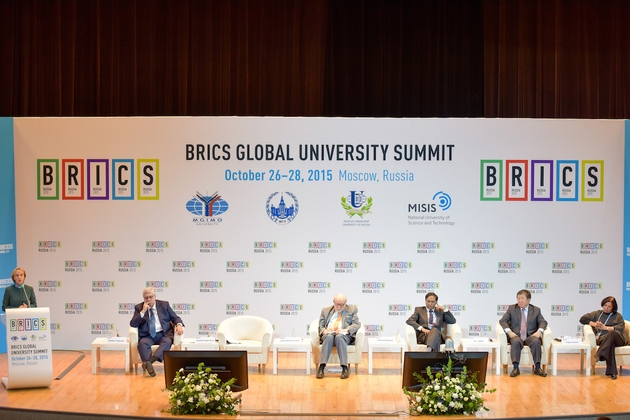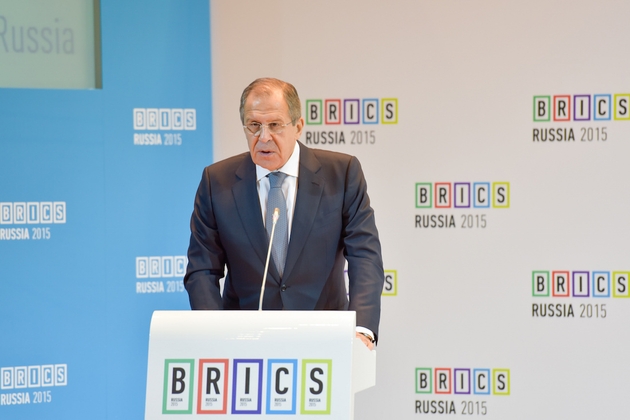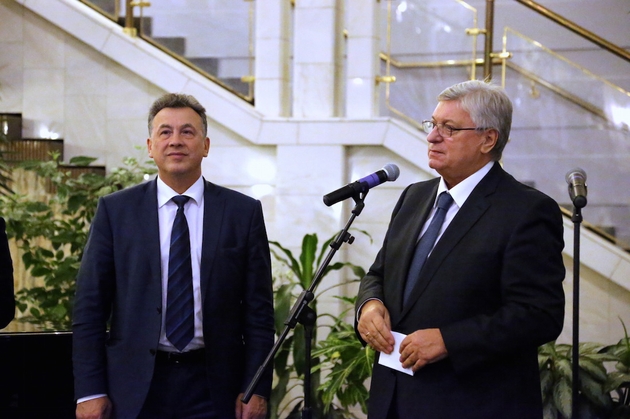ASU Asian Expert and Analytical Center research will be considered when establishing the BRICS Network University
 Today, October 28, the BRICS Global University Summit – an official event organized by Russia’s Presidency in BRICS in 2015-2016 – has continued its work in Moscow. More than 120 vice-rectors and rectors of leading universities of Brazil, Russia, India, China, and South Africa participate in the Summit.
Today, October 28, the BRICS Global University Summit – an official event organized by Russia’s Presidency in BRICS in 2015-2016 – has continued its work in Moscow. More than 120 vice-rectors and rectors of leading universities of Brazil, Russia, India, China, and South Africa participate in the Summit.
On the first day of the BRICS Summit, Minister of Foreign Affairs of the Russian Federation Sergey Lavrov and Deputy Ministers of Education and Science of the Russian Federation Alexander Klimov, Veniamin Kaganov and Lyudmila Ogorodova addressed the participants of the event with the welcoming speech.
Particularly, Minister of Foreign Affairs Sergey Lavrov emphasized that that was the first BRICS University Summit to be considered as a key event under the Russian Presidency. 
“Today’s Forum reflects the high level of cooperation between our countries, and is a clear example of the successful development of relations in scientific and educational areas,” mentioned the Minister. “The ambitious Summit agenda shows the countries’ interest in employment of the joint powerful expert community potential and in strengthening the communications between the academic circles.”
In his speech, at the opening of the summit, Deputy Minister of Education and Science of the Russian Federation Veniamin Kaganov acknowledged unprecedented growth rate of cooperation between the BRICS countries.
“We have observed close contacts and have seen strong progress in regard to cooperation between young scientists and specialists in biotechnologies, agriculture and many other scientific fields,” said Deputy Minister.
Deputy Minister of Education and Science of the Russian Federation Alexander Klimov stated in his speech that the stable and dynamic development of the economy is impossible without the development of universities and education in general.
“Modern industries change the requirements for personnel and specialists, trained by modern universities to a wide extent. The labour productivity is growing, technologies are changing, and as a consequence, the education content must change too,” highlighted Klimov, noting that one of the examples of such change would be
establishment of the BRICS Network University whose statutory documents have been already developed.
Deputy Minister of Education and Science of the Russian Federation Lyudmila Ogorodova reminded that the idea of the BRICS Network University establishment had been supported at the summit in Fortaleza in July 2014 with its purpose to form a grand-scale platform for the networking scientific and technical collaboration between the universities of the five BRICS countries.
“It is the universities that can act as centers of networking cooperation between scientists from different countries. In addition, it’s important to us that they display initiative to organize such collaboration in different areas,” summarized the Deputy Minister.
Today, the BRICS Global University Summit has continued its work on the premises of 4 Moscow universities. Thus, “Education in BRICS countries. BRICS Network University” plenary session was held at Peoples’ Friendship University of Russia, where ASU Rector Sergey Zemlyukov delivered a report as a guest speaker.
Speaking in front of the Summit participants, ASU Rector shared the experience of Altai State University in bilateral interaction with higher education establishments of neighbouring and far-abroad countries, particularly of Central  and South Asia. ASU currently has over 200 partnership agreements made with foreign scientific and educational institutions. Altai State University is one of the most ambitious base universities of the Network University of Shanghai Organization Cooperation; in 2013, ASU initiated Asian Universities Association establishment, and around a year ago, ASU Asian Expert and Analytical Center, supported by Altai Krai Administration, was formed.
and South Asia. ASU currently has over 200 partnership agreements made with foreign scientific and educational institutions. Altai State University is one of the most ambitious base universities of the Network University of Shanghai Organization Cooperation; in 2013, ASU initiated Asian Universities Association establishment, and around a year ago, ASU Asian Expert and Analytical Center, supported by Altai Krai Administration, was formed.
In conclusion, ASU Rector made some suggestions for effective use of the abovementioned practices when establishing the BRICS Network University. In his opinion, in order to accomplish this, existing experience in BRICS universities cooperation through bilateral collaboration should be studied and adapted; the best practices of networking cooperation implemented with the BRICS universities participation (particularly, successful joint educational programs in the framework of SCO University, Asian Universities Association and others) should be unveiled and used; general approaches toward education quality and training results acknowledgements in all BRICS countries in the light of national educational systems and legislation specifics should be developed.
ASU Rector’s suggestions, as well as the recommendations on using ASU Asian Expert and Analytical Center potential, when establishing the BRICS Network University were approved and considered.